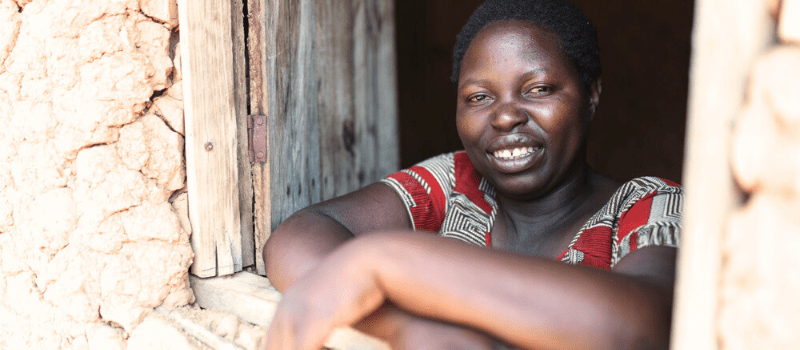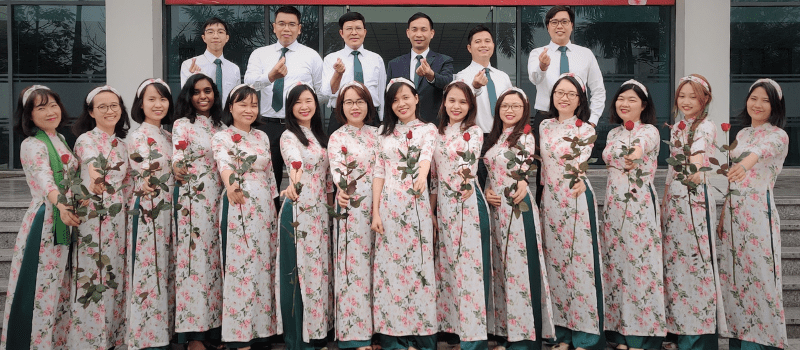This blog was written by Tanja Kisslinger, Director of Communications at VWB, in reflection of a trip to Rwanda in September 2025 to document our Community One Health Empowerment in Rwanda and Senegal (COHERS) program. Photos by Jess Holing for VWB.
A Life of Care
“My days begin with caring for my family and end with caring for my community,” says Louise Marie Mukarugwiza, a mother of six from Nyamagabe District, Rwanda.
For nearly a decade, Louise served her community as a Community Health Worker (CHW), focusing on maternal and child health. She visited households to weigh infants, encourage vaccinations, and counsel parents on nutrition. But then in 2024, she was nominated to join a One Health Team (OHT) because of her reputation for supporting families. “My community knew that I could help people both physically and mentally—teaching them about hygiene and how to prevent diseases and protect their children,” she says.
In fact, Louise is one of more than 550 OHT members (to date) trained through COHERS across Rwanda and Senegal, building a network of local leaders equipped to stop diseases before they spread. “My work has expanded in ways I never expected. Before, I never thought about how animals or even the environment could affect human health. Now I see the connection every day.”
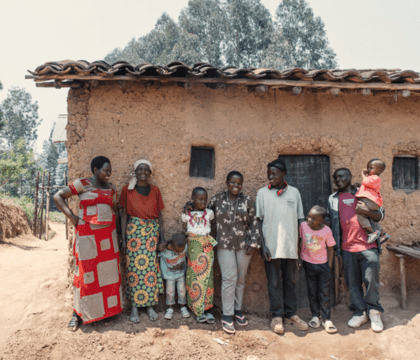 PHOTO: Louise and family outside her home.
PHOTO: Louise and family outside her home.
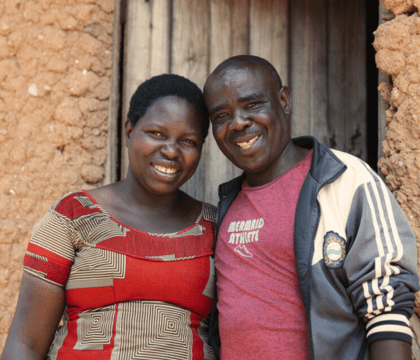 PHOTO: Louise and her husband, Emmanuel.
PHOTO: Louise and her husband, Emmanuel.
 PHOTO: Louise on a farm visit in her OHT vest.
PHOTO: Louise on a farm visit in her OHT vest.
Why One Health Matters in Rwanda
In rural Rwanda, families depend on pigs for both food and income. But when sanitation is poor and animals roam freely, the pork tapeworm, Taenia solium, can spread quickly—moving from pigs into people, where it can cause serious illness, even seizures and death.
For women and girls, the stakes are particularly high. They shoulder the daily work of caring for animals, fetching water, preparing meals, and maintaining hygiene—roles that leave them most exposed to infection, while often having the least access to health resources or decision-making power.
This is the challenge Louise confronts each day. As an OHT member, she helps families see how hygiene, safe pig husbandry, and shared household responsibilities are not just chores—they are life-saving practices that protect entire communities.
Learning One Health
Through COHERS, Louise and her fellow OHT members received a 10-module training series that explored the interconnections between people, animals, and the environment. Modules covered everything from zoonotic disease recognition to WASH (water, sanitation, and hygiene) practices, to gender equality and household decision-making.
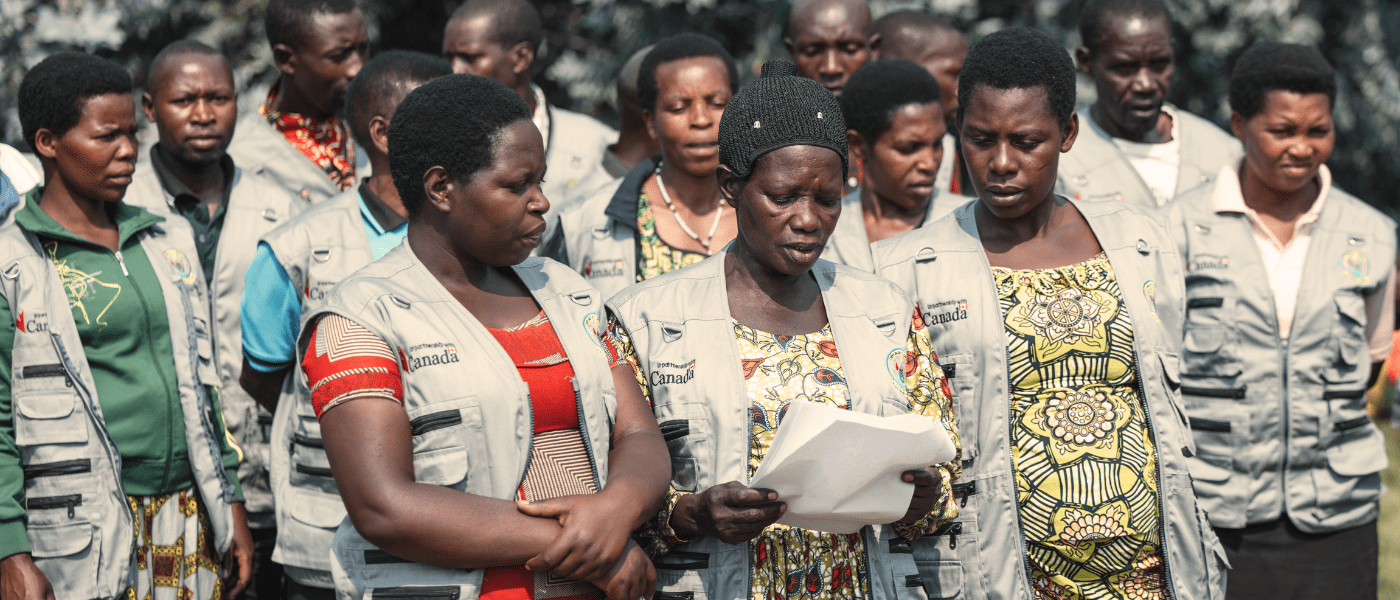 PHOTO: Louise joins her One Health Team in Tare Sector, Nyamagabe District, where monthly meetings strengthen skills and spread vital health knowledge across the community.
PHOTO: Louise joins her One Health Team in Tare Sector, Nyamagabe District, where monthly meetings strengthen skills and spread vital health knowledge across the community.
Before the training, Louise admits that she believed her role as a CHW was only about human health. “I felt the environment had nothing to do with me—it was the farmer’s concern,” she says. “But the training opened my eyes and it brought many different people together. I understood how human health is connected to animals and how diseases pass between us. That was a turning point for me.”
OHTs are designed exactly this way—multi-disciplinary teams that combine CHWs like Louise with Community Animal Health Workers and WASH facilitators. Together, they can address health holistically: human, animal, and environmental. That knowledge has transformed the way Louise advises families.
She remembers visiting one household with three pigs—one of them small and weak. She shared what she had learned during OHT training: pigs, like people, need proper food, clean conditions, and a pen to thrive. The family built a pigsty and improved their feeding practices. Within weeks, the pig began to grow strong.
“Seeing that pig recover gave me so much pride. It showed me that the training works—and that I can help families change their future.”
Gender Equality Begins at Home
Louise admits that changing minds is often the hardest part of her role. Some farmers hesitate to vaccinate or deworm pigs, fearing that an ear tag might lower the animal’s value. Others resist changes to long-held traditions.
To spark dialogue, Louise joins her OHT colleagues in lively gender skits at community meetings. Through humor and storytelling, the skits tackle sensitive issues—like unequal household workloads, poor sanitation, and free-roaming pigs—and then model healthier, more equitable practices. “When people see themselves in the story, it opens the door for conversation and change,” Louise says.
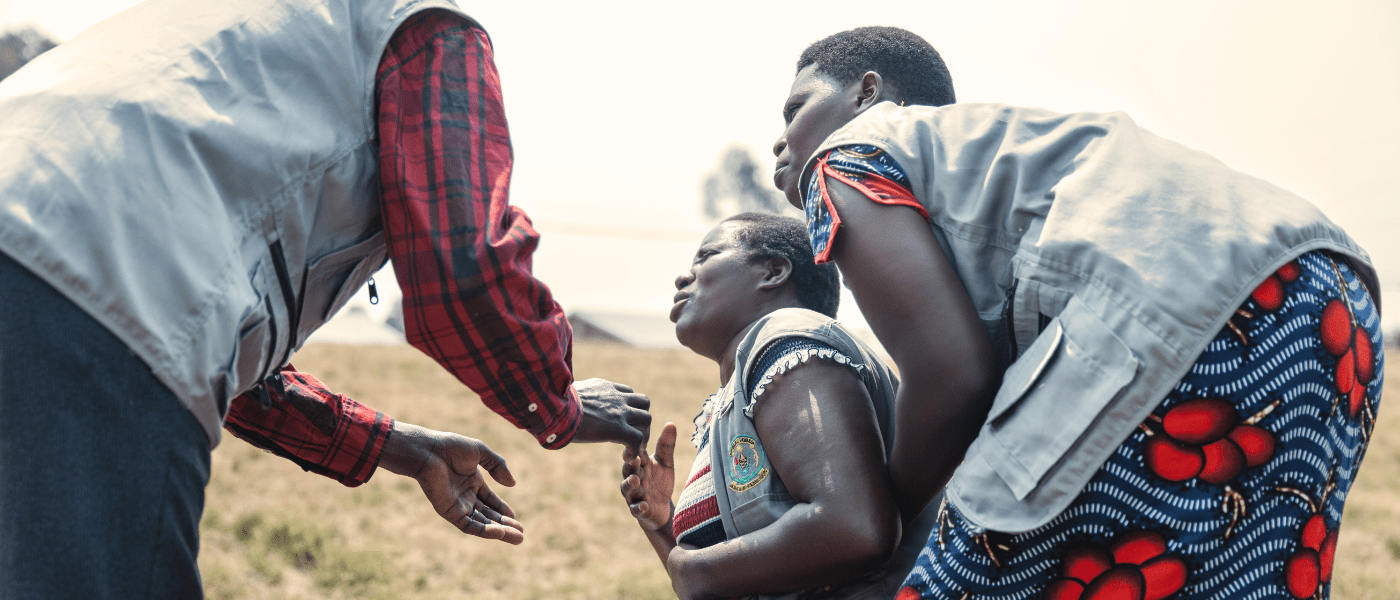 PHOTO: Louise’s OHT peers act out a gender skit in Tare Sector, dramatizing the consequences of poor sanitation in the home and the importance of shared care between men and women.
PHOTO: Louise’s OHT peers act out a gender skit in Tare Sector, dramatizing the consequences of poor sanitation in the home and the importance of shared care between men and women.
She also brings lessons home. After receiving gender training through the OHT, she shared it with her husband. “He now realizes that when we are able to take on more livestock, he needs to play a role and share the work with me,” she says.
“That conversation changed things for us. He understands that health and livelihoods are stronger when men and women share the work.”
Changing Norms Through Hygiene and Sanitation
The OHTs aren’t working alone. Community Hygiene Clubs (CHCs)—made up mostly of women like Louise’s neighbor Josephine Mukagasana—reinforce the same lessons through weekly gatherings. Using songs, picture cards, and peer-to-peer learning, CHCs spread knowledge about hygiene, sanitation, nutrition, and animal management to hundreds of households.
These clubs also model practical solutions: tippy taps for handwashing, disinfected footbaths, safe waste management, and latrines built or upgraded with community support. Members emphasize “leading by example” in their own homes, making hygiene visible and achievable for their neighbors.
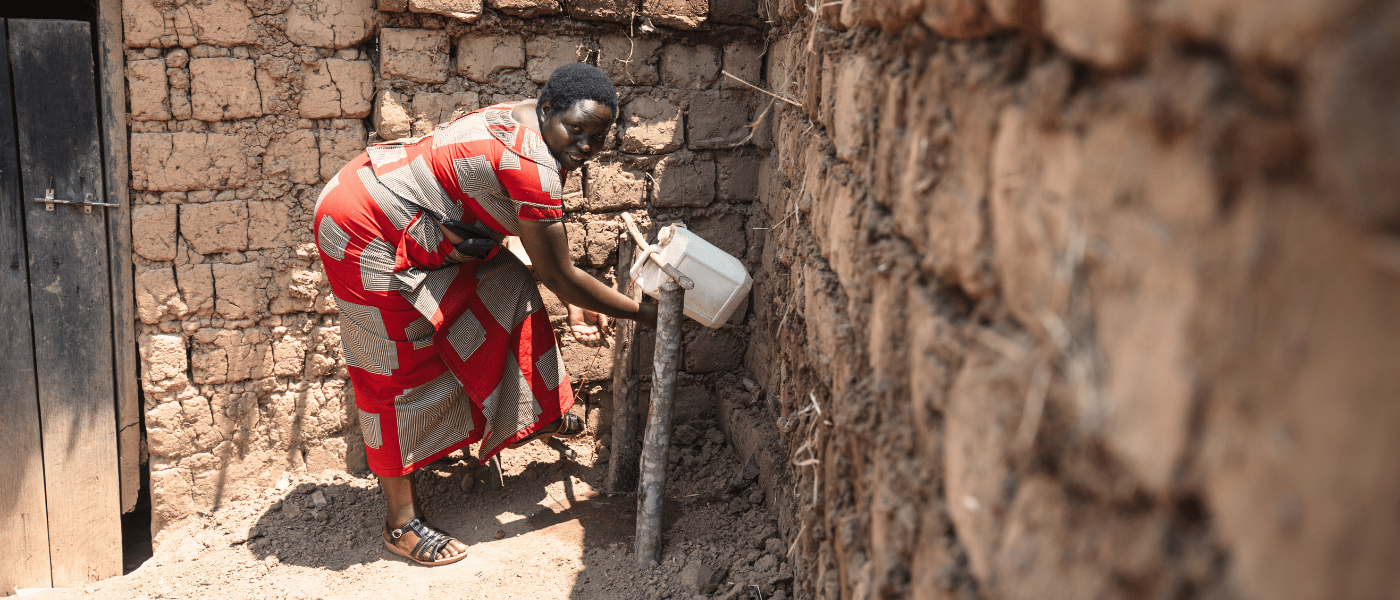 PHOTO: At her home in Nyamagabe District, Louise uses a tippy tap installed as part of her OHT training—reminding her family daily of the power of handwashing to prevent disease.
PHOTO: At her home in Nyamagabe District, Louise uses a tippy tap installed as part of her OHT training—reminding her family daily of the power of handwashing to prevent disease.
Together, OHTs and CHCs are creating ripple effects that go far beyond any one training or household visit. They are building a shared culture of prevention, cooperation, and One Health in action. The result is a shared “handwashing culture” that is changing norms in Nyamagabe.
This work has been critical in preparing communities for larger health campaigns. In Nyamagabe District alone, OHTs helped pave the way for a recent mass drug administration that reached more than 4,400 people with treatment against Taenia solium.
Building Evidence for the Future
Louise’s day-to-day work is not just about advising families—it is also part of something much larger. COHERS is both an implementation program and a research platform. In Rwanda, a randomized control trial is testing different intervention packages: human treatment only, pig vaccination only, hygiene-only, combined approaches, and control groups.
Every household visit, every latrine built, every pig vaccinated contributes to the data that will shape policy and future investment. In Senegal, similar studies are underway to assess the sustainability and cost-effectiveness of OHTs and other interventions.
Louise may not describe it this way, but her work—observing, advising, and reporting back—forms part of the evidence base that could help scale this model across Africa.
Working Together for Healthier Communities
What Louise values most about the OHT is the collaboration—working alongside peers in health, hygiene, water and sanitation. “Working together really works,” she says with a smile. By combining her household visits with community meetings and CHC activities, she sees families adopting new practices—building pig pens, washing hands, and sharing workloads at home. For Louise, each small change adds up to something bigger.
“We can protect ourselves from Taenia—and when we do, we protect our whole community. That’s what keeps me going.”
 PHOTO: At her home, Louise reflects—inspired by the knowledge that over four years, COHERS will empower more than 127,000 people to protect their families through One Health practices.
PHOTO: At her home, Louise reflects—inspired by the knowledge that over four years, COHERS will empower more than 127,000 people to protect their families through One Health practices.
COHERS is a four-year initiative (2023–2027) that strengthens community health systems to prevent zoonotic diseases in Rwanda and Senegal by uniting human, animal, and environmental health. Funded by Global Affairs Canada and led by VWB, COHERS is delivered with local and international partners including the University of Global Health Equity, WaterAid Rwanda, the University of Guelph, the Institute of Health Economics, and Agronomes et Vétérinaires Sans Frontières. Learn more.

